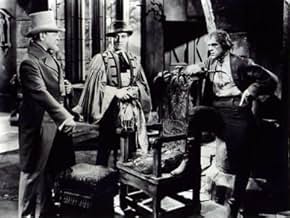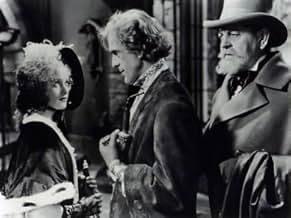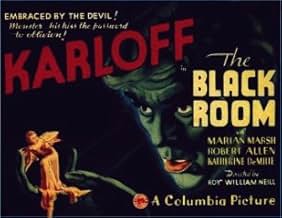Füge eine Handlung in deiner Sprache hinzuIgnoring an ancient prophecy, evil brother Gregor seeks to maintain his feudal power on his his Tyrolean estate by murdering and impersonating his benevolent younger twin.Ignoring an ancient prophecy, evil brother Gregor seeks to maintain his feudal power on his his Tyrolean estate by murdering and impersonating his benevolent younger twin.Ignoring an ancient prophecy, evil brother Gregor seeks to maintain his feudal power on his his Tyrolean estate by murdering and impersonating his benevolent younger twin.
- Mashka
- (as Katherine de Mille)
- Court Clerk
- (Nicht genannt)
- Anton as a Child
- (Nicht genannt)
- Franz - Captured Assassin-Villager
- (Nicht genannt)
- Gregor's Hairdresser
- (Nicht genannt)
- Karl - Lead Villager
- (Nicht genannt)
- Member of the Court
- (Nicht genannt)
- Member of the Court
- (Nicht genannt)
- Michael the Footman
- (Nicht genannt)
- Gatekeeper
- (Nicht genannt)
Empfohlene Bewertungen
An interesting star vehicle for Boris Karloff allowing him to play two roles as contrasting twins; the fact that one of them is deformed may owe something to Lon Chaney and here Karloff demonstrates himself a most worthy successor to the Master's mantle. The period setting - its-folk-tale quality hearkens back to German Expressionism - serves the handsome production extremely well, especially when considering that Columbia Pictures at the time was just starting to pose a serious challenge (following the Oscar sweep of Frank Capra's IT HAPPENED ONE NIGHT [1934]) to the major studios. Director Roy William Neill handles the proceedings with great efficiency and style providing plenty of visual flourishes along the way.
The only criticism one can level at the film regards a couple of slightly contrived plot points: the evil Karloff, who has done away with his benign but paralyzed sibling and whom he impersonates in order to win the girl he loves, is rather stupidly caught by the girl's father when he is spotted in a mirror using his 'lame' hand to sign the marriage contract; Karloff's come-uppance is brought about by his dead brother's faithful mastiff which hates his guts - it's implausible to think that the dog has kept away from Karloff for days (by which time the girl's lover has been convicted for her father's murder) only to conveniently reappear on his wedding day! However, the ironic climax - which allows the prophecy tied with Karloff's family name to be fulfilled - is a splendid one.
All in all, along with THE MASK OF FU MANCHU (1932) and THE WALKING DEAD (1936; see below), THE BLACK ROOM is Karloff's best vehicle of the 1930s which wasn't produced by the studio which made his name, Universal.
Karloff plays twin brothers (one good and one evil, naturally) who have a nasty family prophecy hanging over their heads, seemingly solved when a room inside their castle is sealed up. Also helping matters is the fact that Anton, the nice younger twin, travels the world for a while before being summoned home by his brother, a cruel despot who abuses his position of power. This leads to a great twist, but it won't be revealed here. Gregor, the evil twin, has his eye on beautiful young Thea (the radiant Marian Marsh), and intends to marry her despite the fact that she's already attached to another man, Lt. Lussan (Robert Allen), whom he frames for murder.
"The Black Room" does have its assets, but chief among them are the dual Karloff performances; he's superb at creating two very different personalities. His delicious villainy when he plays Gregor easily rivals his equally compelling turn in "The Body Snatcher" a decade later. Also doing creditable work are Thurston Hall, Katherine DeMille, John Buckler, and Henry Kolker. The dog, Thor, is great too.
Highly recommended to Karloff fans.
Eight out of 10.
Incidentally, is it just me, or does the loud brass fanfare that occurs in the title sequence, and throughout the film at dramatic moments, sound like part of the song "Come Rain or Come Shine" ("days may be cloudy or sunny...")? I just found it a bit distracting to suddenly picture Judy Garland in my mind at all the most tense and dramatic moments of the story.
By Columbia Pictures standards, this film is almost opulent, having several sets and a number of outdoor shots, and having good actors, costumes, technicians and atmosphere all around. But, since it is a Columbia Picture, central Europe looks amazingly like Southern California. Still, it proves that Universal did not have a monopoly on horror in the 1930's.
This is not a supernatural film, except perhaps in the fact that it deals with the subjects of prophecy and fate...it is instead a psychological horror film and so it helps to have the right set of expectations going in. In a way, this film is a kind of precursor to the ambiguous metaphysics and psychological themes of the 1940's Val Lewton horror/noir classics.
What makes this film stand out is Karloff's brilliant performance in the double role of twin brothers, one evil and one good. Karloff is completely convincing in both parts, and it is a genuine pleasure to watch him. It is also striking that even without monster make-up Karloff can scare the pants off you, when he chooses.
Modern horror fans are liable to have trouble accessing this film, but it is recommended to fans of classic horror and classic film in general.
A special note must be payed to the lovely Marian Marsh. Marsh rounds out the cast and does a fantastic job alongside the dominant men of the cast (not just Karloff, but practically everyone). Her beauty and charm sell the picture well, as the Baron's love for her character really drives the plot. Sadly, Marsh gave up acting in 1959 to become an environmentalist. While I fully sympathize with the move, Hollywood was denied a great talent and spirit for the next forty years (the time of Marsh's death).
I strongly encourage those who enjoy older films to give this one a try. I found it both enjoyable and critically satisfying. So many thrillers of the 1930s seem one-dimensional and cliché, but "The Black Room" is fresh, prescient and timeless. I would love to see a deluxe edition of this film, though I suppose it is now too late. Its due failed to come when it mattered most.
Wusstest du schon
- WissenswertesPresent existent version, as presented on Turner Classic Movies, bears title and end credits redesigned for the 1955 wide screen re-release.
- PatzerThe film is set in the early 1800s, yet a statue of St. Therese of Lisieux (Therese Martin) is prominently displayed in the castle three times (at around 17 mins, 40 mins, and 47 mins). Therese Martin was not born until 1873. Furthermore, no statue of St. Therese was made or displayed until after she was canonized, in 1925.
- Zitate
Mashka: Don't you want to kiss me?
Baron Gregor de Bergmann: [Cutting a juicy pear with his knife and eating it as he talks] A pear is the best fruit!
Mashka: Every time you see her, you want to be rid of me.
Baron Gregor de Bergmann: [Seemingly ignoring her] Lots of juice in a pear!
Mashka: Well, you'll find out I'll not be got rid of so easily! Do you hear what I say?
Baron Gregor de Bergmann: Adam should've chosen a pear.
Mashka: You've got it all planned, haven't you? You're gonna marry her. You're gonna make her your wife, your baroness!
Baron Gregor de Bergmann: I like the feel of a pear! And when you're through with it...
[He carelessly tosses it across the room]
- VerbindungenFeatured in Monday Night Fright: The Black Room (1962)
Top-Auswahl
- How long is The Black Room?Powered by Alexa
Details
- Erscheinungsdatum
- Herkunftsland
- Sprache
- Auch bekannt als
- The Black Room
- Drehorte
- Culver City, Kalifornien, USA(Exterior Castle set and Exterior Tyrolean town at the RKO Forty Acres Backlot)
- Produktionsfirma
- Weitere beteiligte Unternehmen bei IMDbPro anzeigen
- Laufzeit
- 1 Std. 8 Min.(68 min)
- Farbe
- Seitenverhältnis
- 1.37 : 1



































